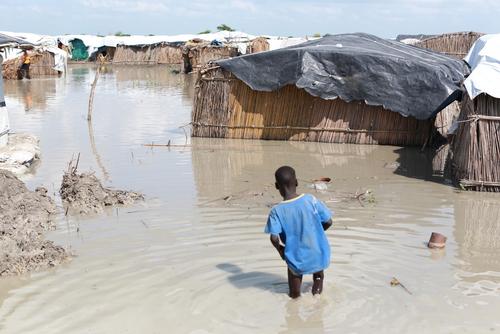In South Sudan, 40,000 people are crowded into a flooded United Nations compound in Bentiu. Living conditions are horrific but it is the only refuge they have from the civil war that broke out last December.
Horrifying living conditions
“Much of the camp was flooded in July with the first heavy downpour of the rainy season. Over one thousand makeshift shelters filled with sewage contaminated floodwater. People used cooking pots to scoop up the water, tried to build mud dams across doorways to prevent water entering, but to no avail.
With few possibilities for drainage, current living conditions in the camp are horrifying and an affront to human dignity. Most of the camp is now knee-deep in sewage, thousands of people cannot lay down and therefore sleep standing up with their infants in their arms.
One child dies everyday
More than one third of residents here are children under five years old. We have seen over 200 deaths in our hospital since May 2014, most of them children. Although mortality rates have improved in the last few weeks, we still see at least one child dying every day.
Many deaths are directly attributable to the appalling living conditions, the inadequate supply of clean drinking water and latrines contributing to a constant burden of infection among children that live here. A devastating cycle sees infection cause weight loss, and weight loss in turn increase vulnerability to infection. This cycle results in children dying from severe acute malnutrition despite the availability of food.
Why don't people leave? They’re too scared to move out of this square kilometer of swamp, fenced in by an earth wall and moat. Within the barbed wire, troops from the United Nations Mission to South Sudan (UNMISS) are managing, under extremely difficult and complex conditions, to provide them with some level of protection. Military police patrol the camp, guards are posted along the perimeter, a single guarded gate allows civilian entry and exit.
Tension remain high
Outside the camp, tension remains high and there is a heavy military presence. Groups of armed men dominate every building and public place in the town. Normal activities are at a standstill and there are few civilians left. Garbage and looted goods are piled up everywhere. The threat of further violence hangs in the air and the sound of low-level combat is audible in the distance.
Civilians entering and exiting the camp are subjected to violence and harassment from armed men positioned a few meters outside the front gate. Women and girls searching for firewood outside the camp are at particular risk of sexual violence and MSF has treated several survivors already.
Not only should perpetrators be held responsible for such acts of aggression against civilians but UNMISS should ensure that civilians are protected outside the perimeter fence too, either through special patrols to protect those gathering firewood, or by installing a gate on the east side of the camp where people say they feel less vulnerable to abuse.
Residents angry and resentful
Understandably, camp residents are angry and resentful. While not easy, drainage is possible with a determined effort. Existing resources and UNMISS equipment onsite such as excavators and diggers must be made available as a priority for this purpose. Furthermore, there remains unused land in the zone and the immediate allocation of land that is less susceptible to flooding would alleviate some of the current suffering. What’s clear is that the current situation is untenable without improvements. People should be safe from disease as well as safe from violence.”



